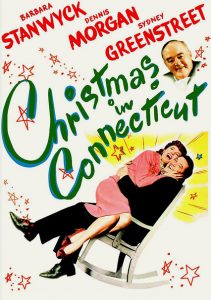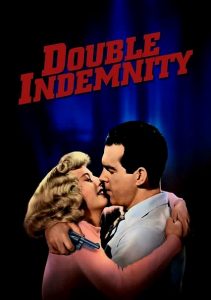Christmas in Connecticut-1945
Director Peter Godfrey
Starring Barbara Stanwyck, Dennis Morgan
Scott’s Review #1,211
Reviewed December 24, 2021
Grade: B+
Christmas in Connecticut (1945) is a flavorful holiday romantic yarn that will please those looking for a snowy, laugh-out-loud experience with zany moments and silly situations, but that works nonetheless.
Any foodie craving a film that dazzles with showcasing excellent meals will enjoy this treat.
The film also oozes New York’s sophistication and New England’s atmosphere, creating a cinematic balance between city and country.
Despite the colorful cover art, Christmas in Connecticut is shot in black and white, which is better.
The key selling point is the instant chemistry between the leads, Barbara Stanwyck and Dennis Morgan, who carry the film.
Stanwyck had just made the vastly different Double Indemnity (1944), and Morgan was a singer, allowing him to perform a memorable song.
Together, they shine.
Actors like Sydney Greenstreet, S.Z. Sakall and Una O’Connor provide perfect comic timing in their roles, allowing the leads to take the stage in the romance department.
Not to be missed is the timely release of the film in 1945, the year that World War II ended, and a necessary time for a cheery film like Christmas in Connecticut. The main character is an Army veteran who begins the film injured in a vet hospital, but the film opts not to make it a dreary, real-life experience.
The action starts in the Atlantic Ocean, where war hero Jefferson Jones (Dennis Morgan) is stranded on a raft with his mate. He imagines the raft a clean dining room table brimming with delicious food and his mate his waiter.
Awakened in a hospital, he tricks his nurse, Mary Lee (Joyce Compton), into becoming his fiancée so he can be fed steak dinners.
While recovering, he grows familiar with the “Diary of a Housewife” column written by Elizabeth Lane (Barbara Stanwyck), the Martha Stewart of the 1940s. She provides cooking advice for her readers.
Mary arranges with Elizabeth’s publisher, Alexander Yardley (Greenstreet), for Jeff to spend the holiday at Elizabeth’s lavish Connecticut farm with her husband and child.
However, the column is a sham, so Elizabeth arranges to marry her friend, John Sloan (Reginald Gardiner), to make it appear that she is the domestic she claims to be in her columns.
How she can write popular columns that dole out cooking and housekeeping advice without knowing anything about either subject is ludicrous but part of the fun.
When she meets Jeff, they fall madly in love at first sight.
The film is one madhouse situation after another, and while Elizabeth and Jeff will undoubtedly live happily ever after, the main appeal is how they will reach that point.
From the first scene, when they meet at the Connecticut farm, there is instant chemistry between Stanwyck and Morgan that lasts the entire film.
Their gazes and glances made me root for them.
The fun is the situations the pair is put through, mostly Elizabeth. As she pretends she has a baby, she borrows a neighbor’s baby and hastily names him Robert, unaware that the baby is a girl. When Jeff, who is more domestic than Elizabeth, changes the baby’s diaper, he is in for a shock.
That Elizabeth knows nothing about cooking or a baby is the hilarity of Christmas in Connecticut. She awkwardly tries to flip a flapjack or handle a cow or other situation comedy moments that make the film as good as it is.
Stanwyck is fantastic as a woman on the verge of being found out.
Handsome Dennis Morgan portrays a good American man who will make an even better husband, which is a large part of his appeal. We long for Elizabeth and Jeff to be together.
A bevy of food scenes and references appear. Besides the flapjacks and steak sequences, steaming plates of good food and drink appear in almost every scene.
Elizabeth’s uncle/chef and housekeeper, played by Sakall and O’Connor, respectively, light up the screen in comical scenes. I hoped the pair would find their romance together, but this never came to fruition.
An endearing seasonal nugget, Christmas in Connecticut (1945), will please fans of good-natured romance tinged with physical comedy. It has a heart and a pleasant veneer showcasing hapless misunderstandings that lead to the inevitable and satisfying conclusion.

